Eye Care For Seniors: Tips for Maintaining Healthy Vision
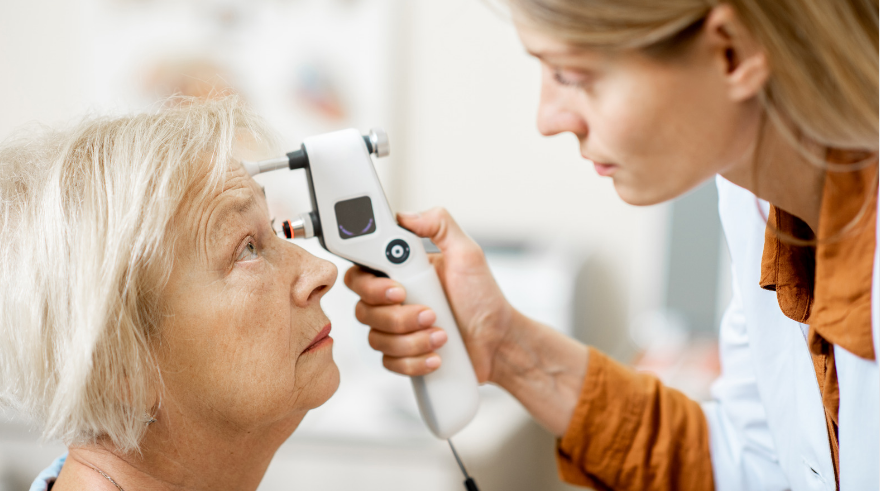
We cannot deny that the risk of developing health problems increases as we age. This is true for your eyesight as well. The truth of the matter is that our eyesight diminishes as we age, whether it is due to health conditions or genetics. Thus, it is important that we continue to stay healthy and aware of our vision and how it changes.
Keeping our vision healthy is vital in order to continue being productive as we age. It is important to address any vision issues right away so that it does not cause further harm.
Throughout this blog post, you will be provided with tips on how you can maintain your vision as you age. You will learn the importance of having an annual eye checkup. Also, we shall present information on various eye diseases that could pose a risk later in life.
Common Eye Diseases and Conditions
There are various eye diseases and conditions that can affect your life. Some of these conditions can cause temporary problems, while others could cause permanent loss. As someone who takes care of an elderly loved one or if you are a senior yourself, it is essential to learn more about these conditions.
Below is a list of some common eye diseases and conditions that you should be aware of:
1. Cataracts
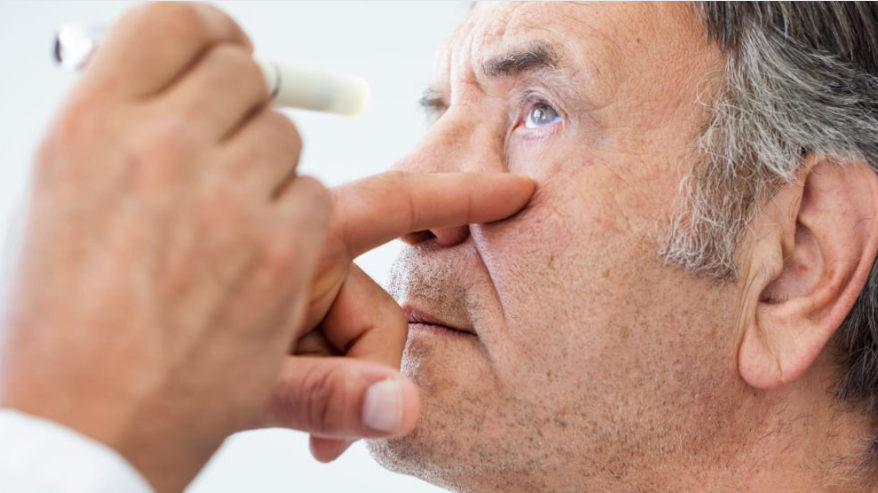
This is a condition in which the lens of your eye becomes clouded, resulting in blurry vision. It usually develops gradually with one’s age. This condition tends to affect both eyes, although it could affect one or both at different times. Usually, cataracts do not need treatment except for surgery.
Warning Signs of Cataracts:
- Difficulty focusing on close objects
- Blurry vision
- Colors look faded
- Increasing difficulty with vision at night.
- Seeing or Noticing “halos” around lights
- Double vision in a single eye
2. Glaucoma
This is a serious condition that could cause blindness if left untreated. Glaucoma is an optic nerve disease that develops when the fluid pressure within the eye increases to a level that damages the optic nerve fibers and optic disks.
Warning Signs of Glaucoma:
- Severe headaches
- Tunnel vision
- Eye redness
- Whitening or haziness of the cornea
- Eye pain
3. Age-Related Macular Degeneration (AMD)
It is an eye condition that affects the macula. The macula is the part of the eyes that help you to see fine details. This condition usually happens when a person reaches their 50s and 60s. Risk factors for AMD aside from old age are having high blood pressure, smoking, and consuming a diet high in saturated fat.
Warning Signs of AMD:
- Blurry vision in one or both eyes
- A Yellowish color on your side vision
- Occasional loss of central vision in one eye that can make it difficult to recognize faces and read the small print
- Red or irritated eyes, especially after waking up from sleep
4. Diabetic Retinopathy
If a person has diabetes, it does affect their eyes. This is due to the fact that high blood sugar levels could lead to damage to the small blood vessels of your eye.
Warning Signs of Diabetic Retinopathy:
- Blurred vision
- Inability to see colors
- Seeing dark spots in your vision
- Deteriorating night vision
- Fluctuations in vision
5. Dry Eye
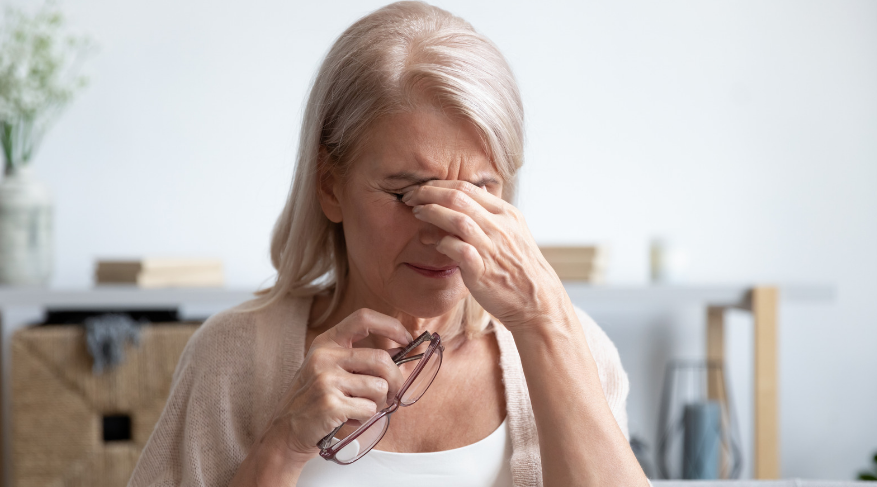
It is a condition that happens when your tears often do not moisten the surface of your eye. It can lead to irritation and pain in the eye. The symptoms of dry eye include squinting, redness around the eyes, discomfort, and difficulty seeing in dim light.
What To Do To Protect Your Vision?
The most important step to protect your vision is to have an annual eye examination. It is important to have your eyes examined by an optometrist or ophthalmologist so that you can rule out serious conditions like glaucoma. They will also perform a vision test and check your eye pressure as part of your eye examination.
The eye doctor might recommend that you get a dilated eye exam, which is a way to detect these diseases in the early periods. During a dilated eye exam, drops are placed into your loved one’s eyes for the pupils to widen, allowing more light to enter. After thirty minutes, the doctor can see the inside of the eyes and check the health of the optic nerve, retina, and other essential parts that cannot be seen otherwise. This process will allow the doctor a good look into the health of your loved ones’ eyes.
Also, Identifying the warning signs of eye diseases is vital in preventing them from worsening. You should be able to recognize the various symptoms of eye conditions so that you can see a doctor and get a treatment plan.
How To Take Care Of Your Eyes?
You can take many steps to take care of your eyes for a healthy and productive life. Follow these tips below for the best way to take care of your eyes:
1. Wear Your Prescription Eyewear
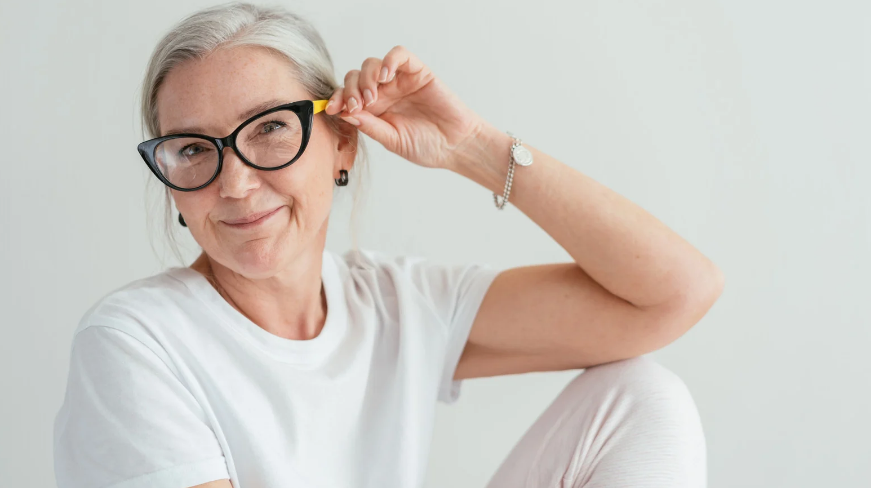
The most important step to take care of your eyes is wearing the glasses your family doctor prescribes. This will be essential in protecting your vision and preventing further eye problems.
Protective eyewear includes goggles and safety glasses, and safety shields designed to provide the right protection for the activity in which your loved one engages.
2. Get Regular Exercise
Exercising regularly is an excellent way to keep your eyes healthy and avoid becoming a victim of these diseases later in life. Exercise enhances blood circulation, which helps improve oxygen levels in your eyes. Any type of exercise routine is beneficial as you get older. It doesn’t have to be strenuous and extensive. Just about twenty minutes or so of exercise every day is already enough.
Some exercises you can try include:
- Walking
- Yoga
- Swimming
- Dancing
- Stretching Exercise for Seniors
- And other light forms of exercise
3. Limit Screen Time
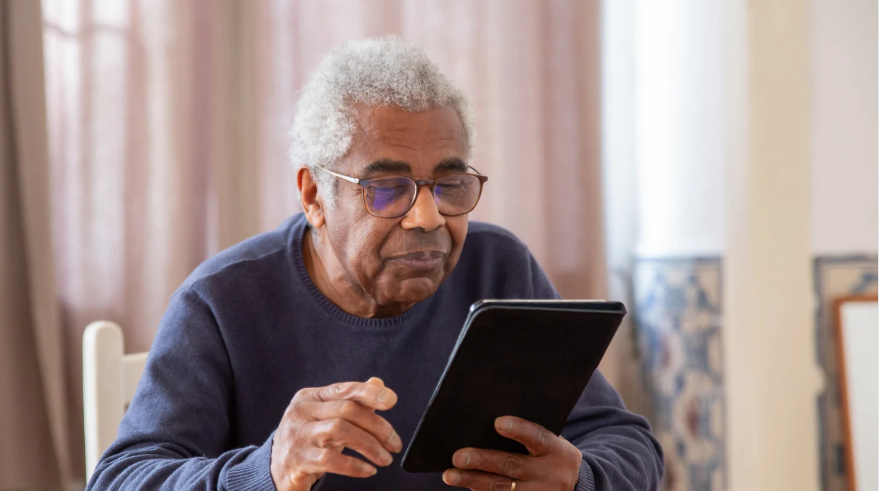
Sometimes your elderly loved one may need to use gadgets. However, you have to be careful with how much they use. Looking at a screen for an extended period can cause eye strain and dry eyes. You can encourage them to try the 20-20-20 rule: Every twenty minutes, look away about twenty feet in front of you for 20 seconds. Doing this simple exercise could reduce strain.
4. Clean Your Hands And Your Contact Lenses
You need to be able to clean your hands and your contact lenses regularly. A number of germs could accumulate on your hands and contacts if you don’t clean them often. These germs can be contagious, causing eye infections, which are also damaging.
It is also essential that you take extra care of them after they have been out of the contacts or glasses case:
- Wash hands with soap and water before handling anything or putting on contact lenses.
- Use a soft cloth to clean your contact lenses instead of using your fingers. It will help prevent scratches and other damage to the contacts.
5. Eat A Healthy Diet
Good eye health starts with eating a healthy diet. Prevent your loved one from eating foods that can hurt the health of their eyes. A healthy diet includes:
- Carrots
- Sweet potatoes
- Spinach and kale
- Cantaloupe and other fruits that are rich in beta-carotene, zinc, or vitamin C
- Green leafy vegetables like broccoli and collard greens contain lutein, a yellow pigment that may protect against cataracts.
Studies have also shown that consuming fish high in omega-3 fatty acids, such as salmon, halibut, and tuna, may have eye health benefits.
6. Get Enough Sleep

Vision loss isn’t a normal part of aging. But it is true that it is common to lose vision as you get older. Keeping your eyes healthy and avoiding vision problems like dry eyes and cataracts are important to younger adults, but even more so for older adults.
Too little sleep can actually harm your eyes by decreasing blood flow in the brain and the retina. So, aim for 8 hours of sleep to prevent eye conditions like these.
If you need help in encouraging your loved one to get enough sleep, you can try these tips:
- Avoid napping during the day.
- Make the sleeping environment as comfortable as possible.
- Install blackout curtains if necessary, and turn off the light if there are any.
- Try sleeping in separate rooms such as a bedroom or a guest room. Your loved one might find it less stressful to sleep in another room.
- Establish a time for sleeping and waking up.
7. Learn Your Family’s Eye Health History
If your family has a history of eye disease, the doctor can come up with a specific plan to help prevent eye problems in your loved ones. A review of your health and family history helps the doctor identify the risk factors you and your loved one may face.
8. Use Ample Light Indoors
Not having enough light indoors can make your eyes feel strained. This is because the pupils widen to allow more light into the eyes. When you are exposed to brighter indoor lights, the pupils shrink again.
Try turning on more lights or opening the windows for sufficient lighting.
9. Avoid Rubbing Your Eyes
Avoid rubbing your eyes when they get dry and itchy from allergies, dust, or a cold. This will increase the likelihood of developing eye infections or scarring in the eyes.
Eye specialists call this “dry eye syndrome” or keratoconjunctivitis sicca, causing more people to come to opticians for eye drops to relieve symptoms related to dry eyes.
10. Keep The Surroundings Clean
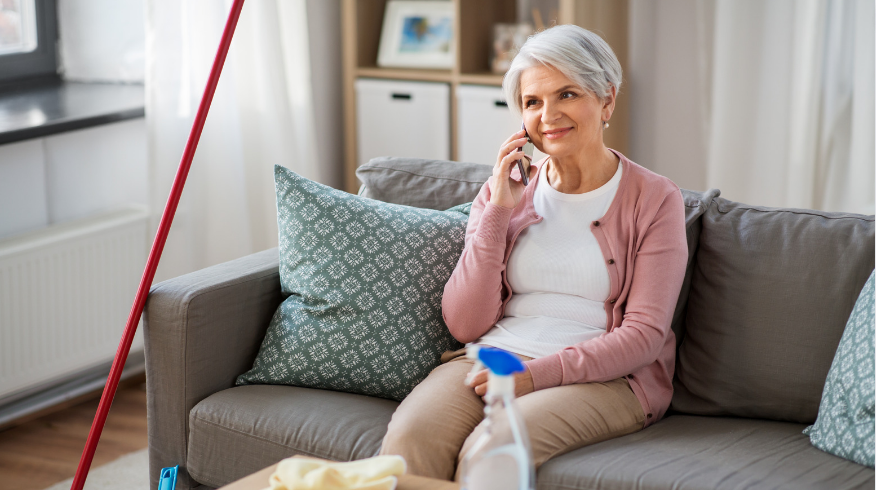
Keeping the surrounding areas clean will prevent dust or other contaminants from getting in your loved one’s eyes.
Also, it can be helpful if you ask your loved one to wear sunglasses when they go outside. This is because they can restrict ultraviolet radiation from entering the eyes, causing cataracts and other eye problems.
Final Thoughts
Our vision is an essential part of our daily lives. We rely on it for so many things that the loss of sight can be devastating. But with simple and practical steps, you can help keep your eyes healthy and strong. Start by encouraging your loved one to visit their eye doctor regularly for a comprehensive eye exam. You can also get them to wear protective eyewear or safety glasses in activities that pose a risk of causing injuries like slip-and-fall accidents.
Here at Serenity Senior Care, we aim to provide you and your loved ones with tips and advice on how to get the most out of your lives. We hope this article has been able to help you in the process. If you need additional information or queries, please feel free to get in touch. Our friendly staff members would be more than happy to assist you further.


